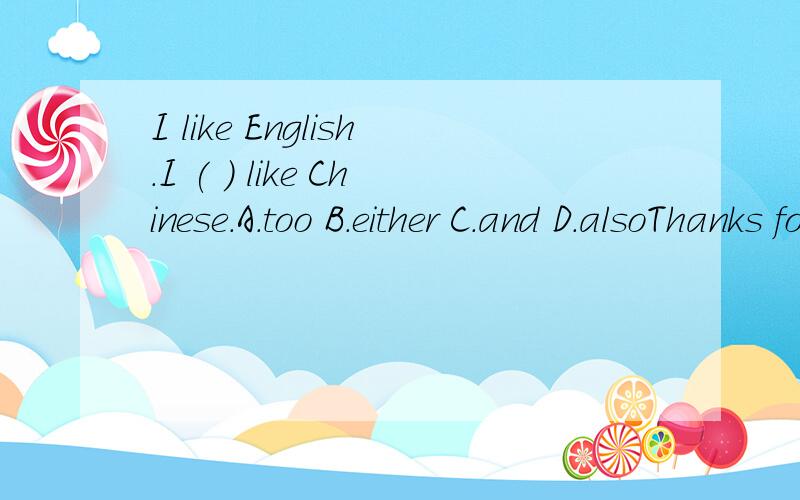I like English.I ( ) like Chinese.A.too B.either C.and D.alsoThanks for ( ) me.A.helping B.help C.helped D.helpsLet's ( ).A.go swimming B.going swimming C.go swim D.going swimWe should ( ) the lights when we leave home.A.turn on B.turn off C.turn up
来源:学生作业帮助网 编辑:作业帮 时间:2024/11/17 08:41:22

I like English.I ( ) like Chinese.A.too B.either C.and D.alsoThanks for ( ) me.A.helping B.help C.helped D.helpsLet's ( ).A.go swimming B.going swimming C.go swim D.going swimWe should ( ) the lights when we leave home.A.turn on B.turn off C.turn up
I like English.I ( ) like Chinese.
A.too B.either C.and D.also
Thanks for ( ) me.
A.helping B.help C.helped D.helps
Let's ( ).
A.go swimming B.going swimming C.go swim D.going swim
We should ( ) the lights when we leave home.
A.turn on B.turn off C.turn up D.turn dowm
为什么?
I like English.I ( ) like Chinese.A.too B.either C.and D.alsoThanks for ( ) me.A.helping B.help C.helped D.helpsLet's ( ).A.go swimming B.going swimming C.go swim D.going swimWe should ( ) the lights when we leave home.A.turn on B.turn off C.turn up
1 D 也,用于肯定句中,即实义动词前,动词BE,情态动词或助动词之后.( A用于肯定句末,B用于否定句末.C‘和’ 连接两个并列万分)
2 A( FOR,介词后接动词ING形式
3 A(固定用法LET‘S DO STH 让某人做某事’ GO SWIMMING 固定用法‘去游泳’
4 B 关上/闭( A打开,C调大,D调小)
D我喜欢英语也喜欢中文
Athanks for doing
A让我们去游泳吧
B我们离开家的时候要关灯。
希望我的回答对你有帮助,祝好再问两题: Tom,I want to watch TV.Please ( ) for me. A.turn it on B.turn it off C.turn on it D.turn off it ...
全部展开
D我喜欢英语也喜欢中文
Athanks for doing
A让我们去游泳吧
B我们离开家的时候要关灯。
希望我的回答对你有帮助,祝好
收起
DAAB